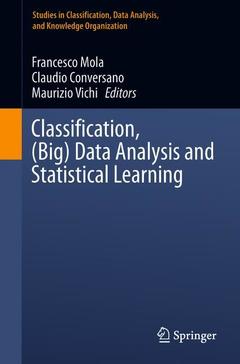Description
Classification, (Big) Data Analysis and Statistical Learning, 1st ed. 2018
Studies in Classification, Data Analysis, and Knowledge Organization Series
Coordinators: Mola Francesco, Conversano Claudio, Vichi Maurizio
Language: English
Subjects for Classification, (Big) Data Analysis and Statistical Learning:
Support: Print on demand
Description
/li>Contents
/li>Biography
/li>Comment
/li>
This edited book focuses on the latest developments in classification, statistical learning, data analysis and related areas of data science, including statistical analysis of large datasets, big data analytics, time series clustering, integration of data from different sources, as well as social networks. It covers both methodological aspects as well as applications to a wide range of areas such as economics, marketing, education, social sciences, medicine, environmental sciences and the pharmaceutical industry. In addition, it describes the basic features of the software behind the data analysis results, and provides links to the corresponding codes and data sets where necessary. This book is intended for researchers and practitioners who are interested in the latest developments and applications in the field. The peer-reviewed contributions were presented at the 10th Scientific Meeting of the Classification and Data Analysis Group (CLADAG) of the Italian Statistical Society, heldin Santa Margherita di Pula (Cagliari), Italy, October 8?10, 2015.
Rank Properties for Centred Three-way Arrays – C. Albers (Univ. of Groningen) et al.- Principal Component Analysis of Complex Data and Application to Climatology – S. Camiz (La Sapienza Univ. of Rome) et al.- Clustering upper level units in multilevel models for ordinal data – L. Grilli (Univ. of Florence) et al.- A Multilevel Heckman Model To Investigate Financial Assets Among Old People In Europe – O. Paccagnella (univ. of Padua) et al.- Multivariate stochastic downscaling with semicontinuous data – L. Paci (univ. of Bologna) et al.- Motivations and expectations of students’ mobility abroad: a mapping technique – V. Caviezel (Univ. of Bergamo) et al.- Comparing multi-step ahead forecasting functions for time series clustering – M. Corduas (Univ. of Naples Federico II) et al.- Electre Tri-Machine Learning Approach to the Record Linkage – V. Minnetti (La Sapienza Univ. of Rome) et al.- . MCA Based Community Detection – C. Drago (Univ. of Rome Niccolò Cusano).- Classi
fying social roles by network structures – S. Gozzo (univ. of Catania) et al.- Bayesian Networks For Financial Markets Signals Detection – A. Greppi (univ.of Pavia) et al.- Finite sample behaviour of MLE in network autocorrelation models – M. La Rocca (Univ. of Salerno) et al.- Classification Models as Tools of Bankruptcy Prediction – Polish Experience – J. Pochiecha (Cracow university) et al.- Clustering macroseismic fields by statistical data depth functions – C. Agostinelli (Univ. of Trento).- Depth based tests for circular antipodal symmetry – G. Pandolfo (Univ. of Cassino) et al.- Estimating The Effect Of Prenatal Care On Birth Outcomes – E. Sironi (Sacro Cuore University) et al.- Bifurcations And Sunspots In Continuous Time Optimal Models With Externalities – B.Venturi (Univ. of Cagliari) et al.- Enhancing Big Data Exploration with Faceted Browsing – S. Bergamaschi (Univ. of Modena and Reggio Emilia) et al.- Big data meet pharmaceutical industry: an application on social media data – C. Liberati (Univ. of Milan Bicocca) et al.- From Big Data to information: statistical issues through a case study – S. Signorelli (Univ. of Bergamo) et al.- Quality of Classification approaches for the quantitative analysis of international conflict – A.F.X. Wilhelm (Jacobs Univ. Bremen).- P-splines based clustering as a general framework: some applications using different clustering algorithms – C. Iorio (Univ. of Naples Federico II) et al.- A graphical copula-based tool for detecting tail dependence – R. Pappadà (univ. of Trieste) et al.- Comparing spatial and spatio-temporal FPCA to impute large continuous gaps in space – M. Ruggeri (Univ. of Palermo) et al.- Exploring Italian students’ performances in the SNV test: a quantile regression perspective – A. Costanzo (National Institute for the Evaluation of Education and Training – INVALSI) et al.Francesco Mola is full professor of Statistics at the Department of Business and Economics at the University of Cagliari. He received his Ph.D in Computational Statistics and Data Analysis from the University of Naples Federico II. His research interests are in the field of multivariate data analysis and statistical learning, particularly data science and computational statistics. He has published more than sixty papers in international journals, encyclopedias, conference proceedings, and edited books.
Claudio Conversano is associate professor of Statistics at the Department of Business and Economics at the University of Cagliari. He received his Ph.D in Computational Statistics and Data Analysis from the University of Naples Federico II. His research interests include nonparametric statistics, statistical learning and computational finance. He has published more than forty papers in international journals, encyclopedias, conference proceedings, and edited books.
Maurizio Vichi is full professor of Statistics and head of the Department of Statistical Sciences at the Sapienza University of Rome. He is president of the Federation of European National Statistical Societies (FENStatS), former president of the Italian Statistical Society, and of the International Federation of Classification Societies (IFCS). He is coordinating editor of the journal Advances in Data Analysis and Classification, editor of the international book series Classification, Data Analysis and Knowledge Organization, and the series Studies in Theoretical and Applied Statistics, published by Springer. He is a member of ESAC
These books may interest you

Statistical Learning of Complex Data 147.69 €



